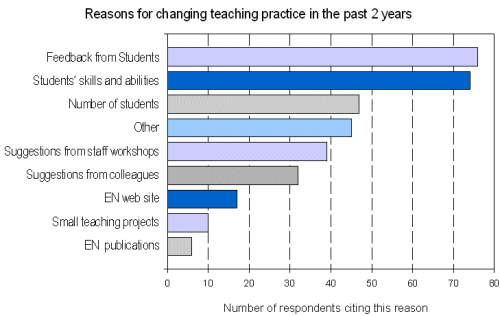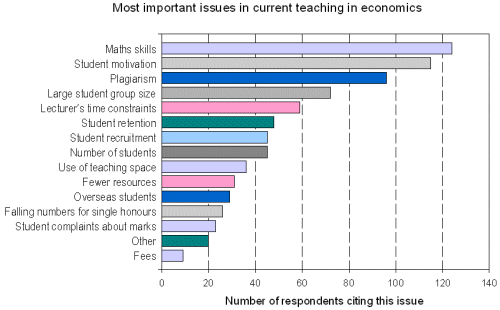Results of the 2007 Economics Network Survey of Lecturers: Executive Summary
PublishedJune 2007
This is a summary of the report and analysis of the Economics Network's Survey of Lecturers, carried out in February and March of 2007. The full report is available as a PDF.
The main objective of the survey was to clarify current practices and issues of concern to Economics lecturers and their students, as well as to provide the Economics Network and those who fund us with information about how Economics lecturers use our services and what impact it has on their teaching.
This survey, along with the Student, Alumni and Employer surveys, is part of the centre's research programme into teaching and learning in Economics. Survey results help the Economics Network gain a better understanding of the needs of the community and shape its future events, resources, briefings and publications in support of Economics lecturers.
The survey was conducted online. 193 respondents completed the survey this time, compared to 185 in 2005 and 125 in 2003. It was intended as an observational study and not a controlled experiment. The survey consisted of 5 questions and benefited from free-text commentary by the respondents to the questions.
1. Number of students
Nearly half of the respondents teach between 101 and 300 students in total this academic year, while a third teach fewer then a 100. One in 25 lecturers teaches more than 600 students. In their comments, lecturers point to the problems of large class sizes, both in lectures and seminars. Problems highlighted include disruptive behaviour and inattention in large lectures, meeting individual students' needs in seminars and marking loads.
2. Change in Teaching Practice

The survey confirms the tendency for increasing numbers of lecturers having to change their teaching methods in the past two years as a result of changes in students' skills and abilities, larger classes and feedback that they receive from students. Changes in teaching practices were influenced by ideas gained from teaching/learning workshops (whether hosted by the Economics Network or other external agency, or by their own department or university), by colleagues, by developments in technology or by changes in the type of class they were required to take. This puts a pressure on the Economics Network to provide more services and resources and support dissemination of good practice throughout the community.
This year 72.5% of respondents said that they had changed their teaching practices in the past 2 years. An additional 6.7% said that, even though they had not changed their practices, they would like to do so. Only one in five said that there was no need to do so. Comments provide an insight into lecturers' reasons for change and their actions.
3. Use of Economics Network resources or services
For various reasons, only half of the respondents have used existing services and resources of the Economics Network and the centre will need to look into new ways of raising awareness and support among the community. Those who use the Network's resources provided examples of the value they gain from particular resources and services.
4. Most important issues in teaching
When questioned about the most important issues in their current teaching, more then half of the respondents point to students' deficiencies in maths skills, student motivation and plagiarism. The Economics Network will look into developing special 'theme' pages on these issues on its website.

5. Support from Economics Network
As for the possible support that the Economics Network could provide to lecturers dealing with those issues, respondents overwhelmingly appreciate the work that centre is already doing, pointing to various resources on the site that they find especially useful: case studies of good practice, mini-projects, surveys, the Why Study Economics? website, maths leaflets, Internet Economist, etc. They express the hope that all this will continue and make suggestions about future developments in Economics, and in Higher Education in general, including the need to raise the profile of teaching and learning issues and to develop a stronger commitment to such issues within the sector.
↑ Top
